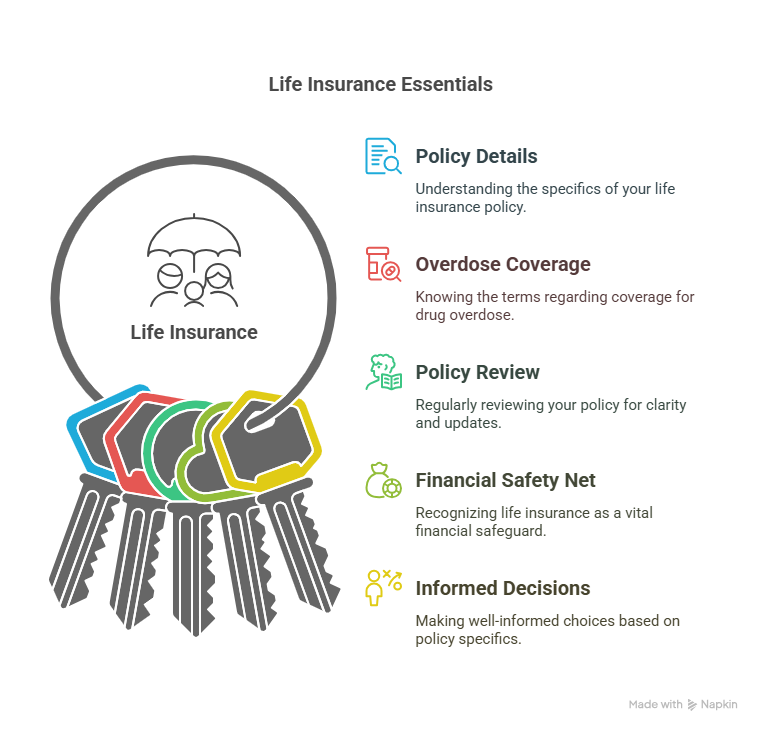Discovering whether life insurance covers drug overdose is crucial for many individuals. When a loved one passes away due to an overdose, the financial burden on the family can be overwhelming. Understanding the specifics of life insurance policies and their coverage can provide clarity during a difficult time.
The question of whether life insurance will pay for drug overdose claims is complex and depends on various factors, including the policy’s terms and conditions. It’s essential to review the details of your life insurance coverage to understand what is included and what is not.
Key Takeaways
- Understanding life insurance policy details is crucial.
- Coverage for drug overdose depends on the policy terms.
- Reviewing your policy can provide clarity on what is covered.
- Life insurance can be a vital financial safety net.
- Knowing the specifics can help in making informed decisions.

Understanding Life Insurance Coverage for Drug-Related Deaths
When it comes to drug-related deaths, understanding life insurance coverage can be crucial for beneficiaries. Life insurance policies are designed to provide financial security to loved ones in the event of the policyholder’s death. However, the circumstances surrounding the death, including drug overdose, can affect whether the insurance company pays out.
General Coverage Principles
Generally, life insurance policies cover deaths resulting from various causes, including accidents and illnesses. However, drug overdose is a specific circumstance that may be treated differently depending on the policy terms. Most policies differentiate between accidental and intentional overdose, with the former typically being covered and the latter often being excluded or subject to contestability.
Types of Life Insurance Policies and Their Coverage Differences
There are primarily two types of life insurance policies: term life insurance and whole life insurance. Term life insurance provides coverage for a specified period, whereas whole life insurance covers the policyholder’s entire life. The coverage for drug-related deaths can vary between these policy types, with some having more stringent conditions than others. Key differences include:
- Term Life Insurance: Generally more straightforward, with coverage based on the policy term.
- Whole Life Insurance: Often includes a cash value component and lifetime coverage, but may have more complex conditions.
Will Life Insurance Pay for Drug Overdose? Key Factors
The payout of a life insurance policy in the event of a drug overdose depends on several critical factors. Understanding these elements can help policyholders and their beneficiaries navigate the complexities of filing a claim.
Accidental vs. Intentional Overdose Distinctions
One crucial factor is whether the overdose was accidental or intentional. Life insurance policies typically cover accidental deaths, but the distinction can be challenging. Accidental overdose might be covered if it can be proven that the death was not intentional.
Policy Exclusions and Contestability Periods
Policy exclusions and contestability periods are also vital. If a policy excludes deaths related to drug overdose, claims may be denied. Moreover, if the overdose occurs within the contestability period (usually 1-2 years after the policy is issued), the insurer may investigate the claim more thoroughly.
Prescription vs. Illegal Drug Considerations
The type of drug involved also matters. Overdose on prescription drugs might be treated differently than illegal drug overdose, depending on the policy terms.
Key factors include:
- Circumstances of the overdose
- Policy terms and exclusions
- Type of drug involved
Understanding these factors can help beneficiaries navigate the claims process more effectively when filing a drug overdose claim life insurance.
Navigating the Claims Process for Overdose Deaths
Beneficiaries of life insurance policies often face challenges when filing claims related to drug overdose deaths. The process can be complex and emotionally taxing, requiring a clear understanding of the necessary steps and documentation.
To begin, it’s essential to understand the general requirements for filing a claim. Beneficiaries should contact the insurance company promptly to initiate the process.
Required Documentation for Beneficiaries
Beneficiaries will need to gather and submit specific documents to support their claim. These typically include:
- The original life insurance policy document
- A death certificate
- Proof of identity for the beneficiary
- Any additional forms required by the insurance company
Having all necessary documents ready can help streamline the claims process.
How Insurance Companies Investigate Overdose Claims
Insurance companies investigate overdose claims to verify the circumstances surrounding the death. This may involve reviewing medical records, police reports, and other relevant documentation. The goal is to determine whether the death was accidental or intentional, as this can impact the payout of life insurance and drug overdose benefits.
Legal Options When Claims Are Denied
If a claim is denied, beneficiaries have legal options to contest the decision. This may involve filing an appeal with the insurance company or seeking legal representation to negotiate a settlement. Understanding these options is crucial for beneficiaries seeking drug overdose reimbursement life insurance benefits.
Conclusion
Understanding whether life insurance will pay for drug overdose is crucial for policyholders and their beneficiaries. As discussed, the type of life insurance policy, the circumstances surrounding the overdose, and the policy’s terms and conditions play significant roles in determining coverage.
Insurance coverage for drug overdoses can be influenced by several factors, including whether the overdose was accidental or intentional, the type of drug involved, and the policy’s exclusions and contestability period. Beneficiaries should be aware of these factors when filing a claim.
To ensure that beneficiaries receive the benefits they are entitled to, it is essential to review life insurance policies carefully and understand the terms and conditions. By doing so, policyholders can make informed decisions about their coverage and beneficiaries can navigate the claims process more effectively.
FAQ
Will life insurance pay for a drug overdose?
It depends on the policy terms and circumstances of the overdose. If the overdose is deemed accidental, the claim is more likely to be paid.
How do life insurance companies determine if an overdose was accidental or intentional?
Insurance companies investigate the circumstances surrounding the overdose, reviewing medical records, toxicology reports, and other evidence to make a determination.
What is the contestability period in a life insurance policy, and how does it affect drug overdose claims?
The contestability period is typically two years, during which the insurer can investigate and deny claims if they find evidence of misrepresentation or concealment. If the policyholder dies from a drug overdose within this period, the insurer may scrutinize the claim more closely.
Are prescription drug overdoses treated differently than illegal drug overdoses under life insurance policies?
Yes, prescription drug overdoses may be viewed more favorably if the medication was prescribed by a doctor and taken as directed. However, insurance companies may still investigate to determine if the overdose was accidental or intentional.
Can a life insurance claim be denied due to drug overdose?
Yes, if the insurer determines that the overdose was intentional or if the policyholder misrepresented their drug use on the application, the claim may be denied.
What are the legal options if a life insurance claim is denied due to a drug overdose?
Beneficiaries can appeal the decision or seek legal action against the insurance company if they believe the claim was wrongly denied.
How can beneficiaries ensure a smooth claims process for an overdose death?
Beneficiaries should gather all required documentation, including medical records and police reports, and work closely with the insurance company to facilitate the claims process.
Does life insurance coverage for drug overdose vary between term life and whole life insurance policies?
The type of policy may influence the coverage, as some whole life policies may have more stringent requirements or exclusions. However, both term and whole life policies generally follow similar principles in handling drug overdose claims.




